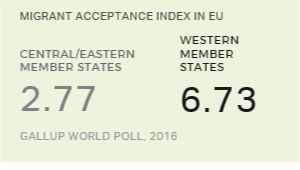Since Russia's invasion of Ukraine last week, hundreds of thousands of Ukrainians have fled their country for the safety of their neighbors to the west, with many more behind them.
While Ukrainian refugees have been welcomed with open arms so far, the larger question is how people in these countries could react if these numbers swell into the millions and if Ukrainians end up staying.
Many of Ukraine's western neighbors, including Hungary and Slovakia, have consistently ranked among the least accepting in the world for migrants, and almost all (except Moldova) did not vote for the UN migration pact in 2018. (However, all neighbors except Hungary voted in favor of the UN compact on refugees that same year.)
Moldova, Poland and Romania Previously Most Welcoming to Migrants
As of Monday, more than 500,000 refugees have fled Ukraine since Thursday, many of them crossing into Poland, Moldova and Romania. Of Ukraine's western neighbors, these three countries were the most welcoming of migrants in 2019, which notably predates the Belarus border crisis in 2021 that led Poland to build a wall to keep migrants out.
Half of Moldovans (50%) and more than four in 10 Poles (42%) surveyed said migrants living in their countries was a "good thing," while roughly 30% in each country viewed it as a "bad thing." Thirty-nine percent of Romanians also said migrants living in their county was a good thing, while 29% said it was a bad thing.
| Good thing | Bad thing | Depends (Volunteered response) | Don't know/Refused | |
|---|---|---|---|---|
| % | % | % | % | |
| Moldova | 50 | 26 | 15 | 9 |
| Poland | 42 | 30 | 19 | 9 |
| Romania | 39 | 29 | 16 | 17 |
| Slovakia | 18 | 50 | 27 | 5 |
| Hungary | 8 | 56 | 29 | 7 |
| Gallup, 2019 | ||||
Thousands of Ukrainians are also making their way to neighbors in Hungary and Slovakia, where residents have been far less welcoming to migrants compared with their neighbors. In 2019, a majority of Hungarians (56%) and half of Slovakians (50%) said migrants living in their country was a bad thing, and far fewer saw it as a good thing.
These numbers are not surprising given that both countries ranked among the least accepting of migrants on Gallup's Migrant Acceptance Index scale in 2016 and again in 2019. Hungary was one of several European countries that erected border fences during the European migrant crisis in 2015.
Who Migrants Are Matters in All Countries
Who migrants are factors into people's attitudes in all five countries, which may give Ukrainians an edge in the current crisis -- given that several countries share their Slavic ancestry and adherence to the Eastern Orthodox and Catholic faiths. Large percentages in each of these countries volunteered that whether migrants living in their country was a good thing or bad thing "depends."
Implications
A crush of Ukrainian refugees fleeing a Russian invasion was likely the farthest thing from people's minds when they were asked about migrants in 2019. More than likely, they were still thinking about the then-recent migrant crisis that saw millions of migrants flee war-torn Syria, Iraq, Afghanistan and other countries and seek safety in Europe.
Unlike that crisis, instead of building more walls, Poland and Hungary's governments are taking a welcoming stance toward Ukrainian refugees and migrants, with Hungary even offering protection to all arriving citizens and legal third-country nationals arriving from Ukraine.
Still, if the situation in Ukraine escalates, as many as 5 million could stream across the borders, which could test the hospitality to migrants in countries where this is already in somewhat short supply.
Read more about Gallup's research on international migration.
For complete methodology and specific survey dates, please review Gallup's Country Data Set details.
Learn more about how the Gallup World Poll works.




